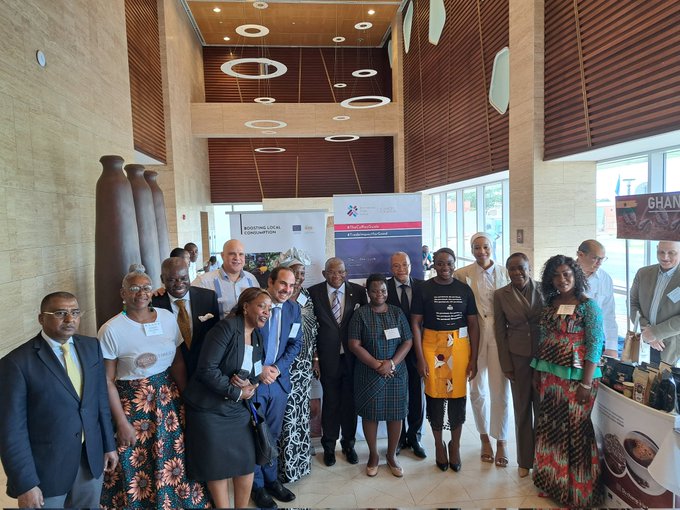By Pita Ligaiula in Luanda, Angola
The Organisation of African, Caribbean and Pacific States (OACPS) recognises private sector as a main development actor,” says Secretary General, Georges Rebelo Chikoti.
He was speaking at the ACP Peer-to-Peer Learning Event, funded by the European Union (EU)and World Bank. This is one of the side events of the 10th OACPS Head of States Summit in Angola this week.
Chikoti said the event seeks to foster the exchange best practices and experiences on the Macro component of the ACP-EU Business Friendly programme.
“One of the main objectives of the OACPS under the revised Georgetown Agreement, is to foster the sustainable development of our Member-States and support their gradual integration into the global economy with the ultimate objective of reducing and eventually eradicating poverty, consistent with Sustainable Development Goal number 1.
“The OACPS recognises the private sector as a main development actor. We are convinced that a competitive and dynamic private sector is crucial for achieving smart, sustainable, and inclusive growth,” Chikoti told business leaders.
To promote the sustainable development of Member States, the OACPS, together with its development partners including the EU, the World Bank, UNIDO and the International Trade Centre (ITC), is implementing a Private Sector Development Strategy (PSDS), founded on four pillars with a view to foster the development of a more competitive and responsible business sector.

The First Pillar: Promoting a policy and regulatory framework that is conducive to the emergence of a competitive local and regional private sector. This includes, among others, improving regional policies and harmonising regulations via and inclusive approach based on public-private dialogue at country and regional level.
The Second Pillar: Strengthening key national and regional private sector support institutions such as: chambers of commerce, training institutes, laboratories, producer associations as well as research and innovation centres. Consequently, we strive to strengthen production capacity by providing technical assistance and business development services, fostering research, innovation, and entrepreneurship, enhancing the quality and competitiveness of products and services supplied by our MSMEs to the local, regional, and international markets.
The Third Pillar of the PSD Strategy: Enhancing microfinance support by fostering financial inclusion via a holistic approach. Under this pillar we seek to address constraints at macro, meso and micro levels. Our joint approach considers financial inclusion as a transformative tool that can help improve both household welfare and spur enterprise activity. Financial inclusion has the capacity to connect people and businesses in the informal sector to the formal economy, to markets and to better social welfare mechanisms. Under this pillar, together with the European Union, we have developed specific initiatives to foster digital financing, the informal economy, women’s empowerment, and job creation for youth.
The Fourth pillar: Catalysing private investments and commercial finance for development via blending with a view to improving access for our enterprises and encourage private investments through risk-sharing mechanisms and guarantee schemes.
SG Chikoti said this framework, the Organisation will strive to promote cross-fertilisation of experiences and dissemination of best practices, business-to-business collaboration, and stimulate transfers of skills and knowledge between and within Africa, the Caribbean, and the Pacific.
“The OACPS is strongly committed to ensuring that efforts in supporting the competitiveness of our private sector are fully aligned towards the achievement of the 2030 Agenda and Sustainable Development Goals, the SAMOA Pathway, and the Paris Agreement, which in turn will allow us to achieve the objectives of the Revised Georgetown Agreement and the new OACPS-EU Partnership Agreement,” said Chikoti.
He said in the implementation of this strategy, the OACPS is embracing the following guiding:
*Equitable representation of beneficiary countries and regions;
*Greater participation of OACPS agencies and institutions in implementing programmes;
*Support for institutional capacity-building at national, regional, and continental levels;
*Sharing of Private Sector Development best practices among OACPS member countries and regions;
*Complementarity with ongoing OACPS-EU Private Sector Development programmes at national, regional and all OACPS levels;
*Streamlining instruments for Private Sector Support; and Greater OACPS visibility in the implementation of programmes.
SOURCE: PACNEWS














